How can I prove that n! is not in O(n^p) for any constant natural number p? And is (n k)(n choose k) in O(n^p), for all k?
3 Answers
Stirling's approximation says that
log (n!) = n log n - n + O(log n) = O(n log n)
But
log (n^p) = p log n = O(log n)
for constant p. Clearly n! grows faster than n^p and hence it is not O(n^p).
- 69,683
- 7
- 133
- 150
-
1You could also note without using stirlings approximation that log(n!)=log(n)+log(n-1)+...+log(2)+log(1). log(1)=0, so every other term has to be _at least_ log(2) or larger. That gives log(n!) > n*log(2), which of course means it's O(n). As you noted it's actually O(n*log n), but O(log n) also grows way faster than O(log n). – Emil H Nov 07 '10 at 01:10
-
+1. I was attempting not to do the homework for them ;). but I probably should have hinted at Stirling's factorial approximation. – Mitch Wheat Nov 07 '10 at 01:10
You can prove that n! is not in O(n^p) for any constant natural number p, by showing that you can always choose n (for a fixed constant p), so that n! > n^p.
(to get an idea, pick a few low values of p and plot n! against n^p)
The reasoning for the second part follows the same lines. Bound (n choose k) and then use first part.
Hint: as Casablanca noted, you can use Stirling's approximation
- 295,962
- 43
- 465
- 541
-
1To be precise, *for all* n > n0, where n0 is some positive integer. You can't choose a single value n. Counterexample: p=10, n=2. 2^10 > 2!. – Steve Tjoa Nov 07 '10 at 01:02
-
I'm sorry, I should revise that comment. To *disprove* n! = O(n^p): given p, then for *any* n0 > 0, there exists a (single) value n > n0 such that n! > n^p. – Steve Tjoa Nov 07 '10 at 01:42
Edit (3/2011) - easier method using only simple calculus
One way to show O(n!) does not equal O(n^p) is to compare the log of n! with the log of n^p.
ln(n!) = sum(ln(i)) {i: 1 to n}
ln(n^p) = p*ln(n)
That doesn't seem to help since we don't know what the sum of the logs would be. The trick is to calculate a lower bound by using the integral of ln(i)di from 1 to n
This can be seen in the image below that the ln(x) in black is less than the sum step function in blue.

Given that the indefinite integral of ln(i)di is i*ln(i) - i + C, we can integrate from 1 to n to get:
n*ln(n) - n + 1 as the lower bound.
And because no p can be chosen that is larger than all possible n:
O(pln(n)) < O(nln(n)), O(n^p) < O(n!)
note: integrating ln(n) to get an approximation to ln(n!) is the basis for Stirling's approximation. This is a rougher approximation and if you continue it by taking the anti-log: n! >= e*(n/e)^n, whereas Stirling's has sqrt(2*pi*n) instead of e.
Integrating from 1 to n+1 would give you an upper bound (the sum step function would fit inside the graph of ln(n))
- 5,622
- 1
- 28
- 45